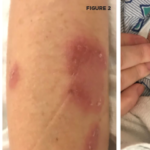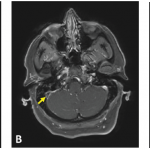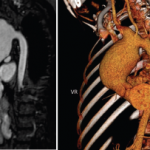Weighing In
Rheumatologists applaud research in this area because of the lack of effective treatments for oral ulcers associated with Behçet’s disease, especially treatments that don’t have major side effects.
“Refractory oral aphthous ulcerations in patients with Behçet’s disease is a clinical challenge, and the suggestion of efficacy and tolerability of an intervention with which rheumatologists are comfortable offers hope for expanding our therapeutic armamentarium in this disease,” says Robert F. Spiera, MD, Hospital for Special Surgery, New York.
“There is an unmet need not only for oral ulcer treatment, but also other manifestations of Behçet’s [disease], and hopefully, new therapies will be extended to these manifestations of Behçet’s [disease] in the future,” says Yusuf Yazici, MD, clinical associate professor of medicine, New York University Grossman School of Medicine.
In addition to the aforementioned treatments, apremilast was shown to be effective to treat Behçet’s disease-related ulcers in recent controlled studies, Dr. Saadoun says. For example, results from the phase 3 RELIEF trial with apremilast showed favorable results in Behçet’s disease patients with mouth ulcers.2 However, apremilast’s efficacy on other Behçet’s disease manifestations, including joints, remains unknown.
“There is potentially a need for other therapies for managing this less ‘organ-damaging’ manifestation of the disease, which nevertheless has an important impact on quality of life,” Dr. Spiera says.
Further research with larger studies is needed. “The study was not placebo-controlled and was small,” says Andrew Sulich, MD, Shores Rheumatology, St. Clair Shores, Mich., and assistant clinical professor, Oakland University William Beaumont School of Medicine, Rochester, Mich. “Phase 3 trials would be welcomed.”
“I think properly controlled studies are needed so we can know if ustekinumab really works for Behçet’s [disease] oral ulcers or not, before approval in the U.S. can be considered,” Dr. Yazici says.
Even with the limitations, Dr. Spiera was encouraged by the results, including how other disease manifestations showed improvement, in particular musculoskeletal symptoms and cutaneous features, as well as the overall Behçet’s disease activity score.
Of the currently used treatments in the U.S., only apremilast is approved specifically for Behçet’s disease.3 Dr. Yazici says, “Most of the data we have on these drugs are either not from randomized controlled trials or [come] from a few randomized controlled trials that, for the most part, have not shown real benefit for oral ulcers.”
Vanessa Caceres is a medical writer in Bradenton, Florida.
References
- Mirouse A, Barete S, Desbois A-C, et al. Long-term outcome of ustekinumab therapy for Behçet’s disease. Arthritis Rheumatol. 2019 Oct;71(10):1727–1732.
- Hatemi G, Mahr A, Takeno M, et al. OP0082 Apremilast for Behçet’s syndrome: A phase III randomised, placebo-controlled, double blind study (RELIEF). Ann Rheum Dis. 2018;77:91–92.
- Otezla prescribing information.



